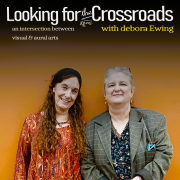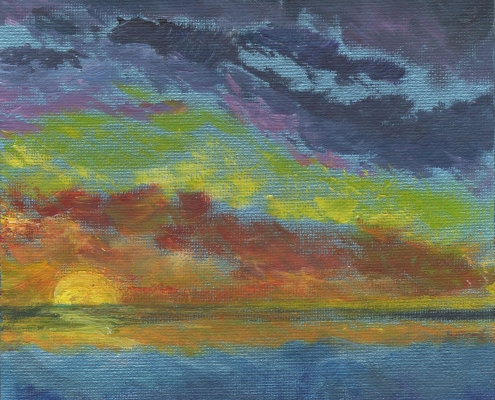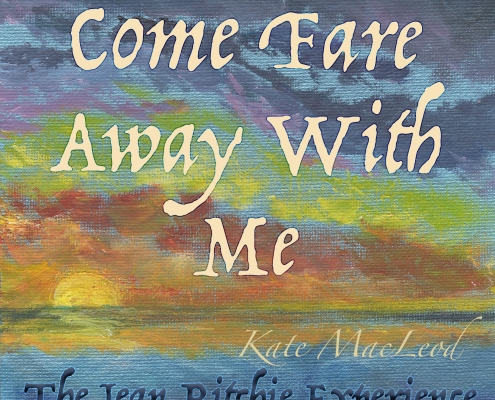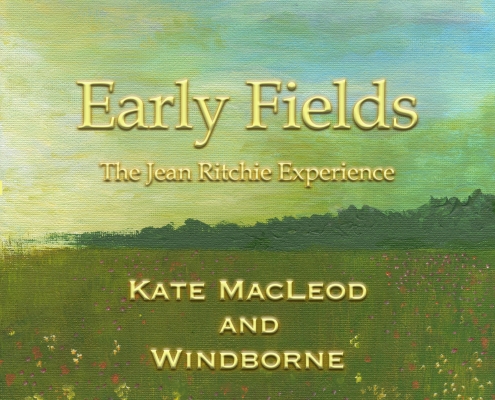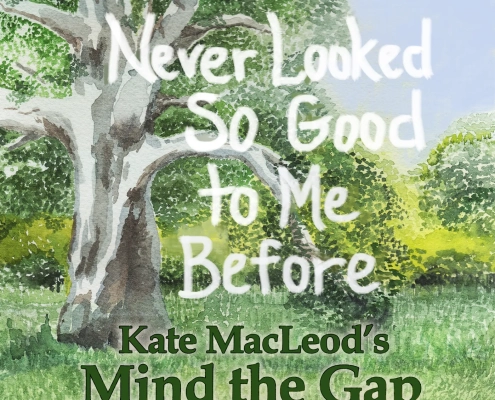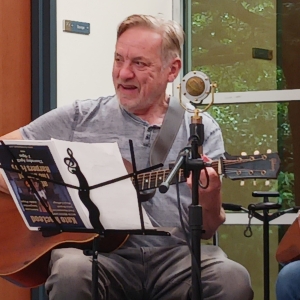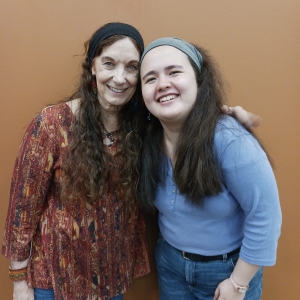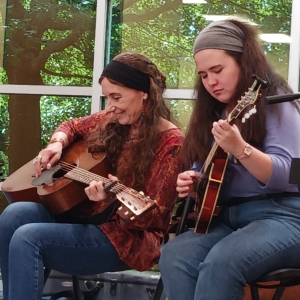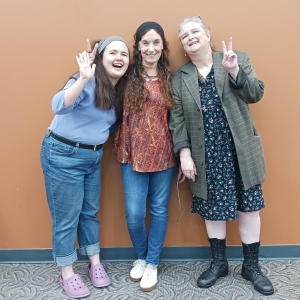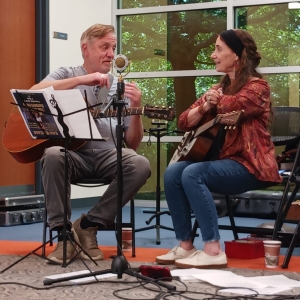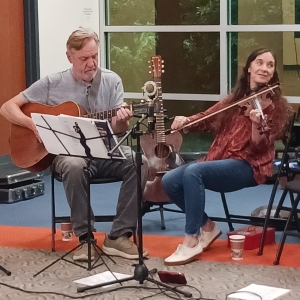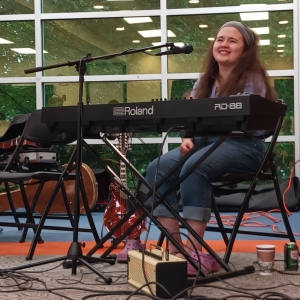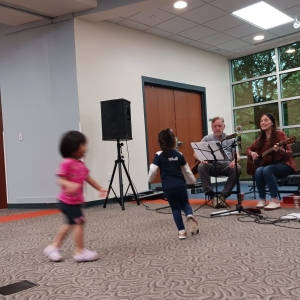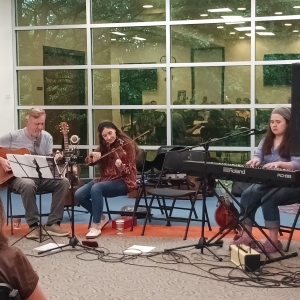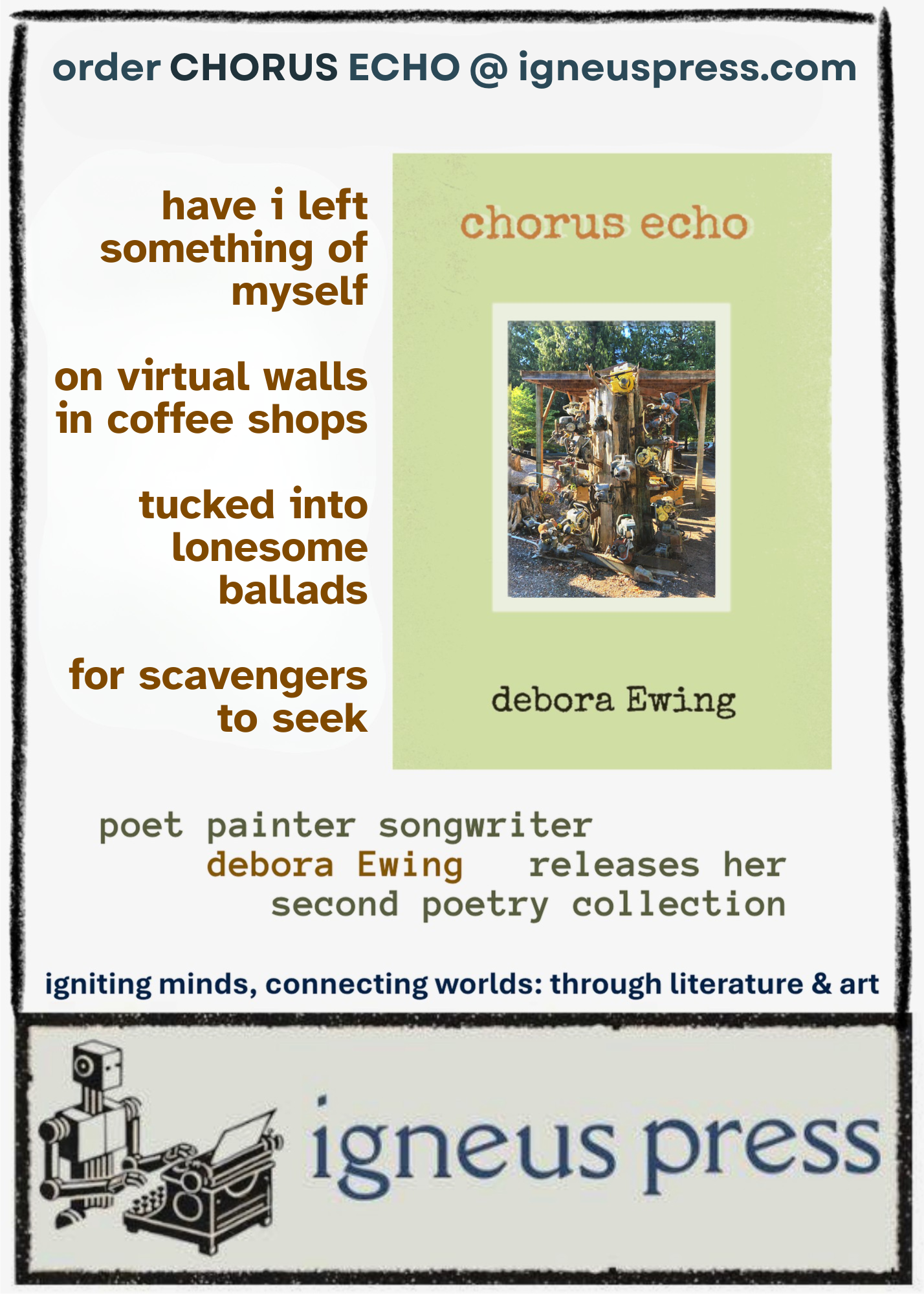Kate MacLeod and the Beauty of Impermanent Things
NUMBER 39 - in which we talk of art and music, water, family, and trains (some with bread.)
September 2025
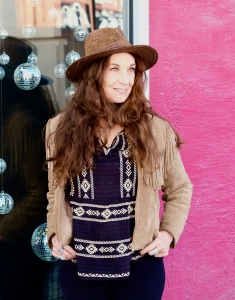 Kate MacLeod defines her original music as “Neo-traditional,” and that fits. Original or classic tune, each song she plays has a solid foundation – don’t you feel like you’ve heard it before? – but then the music takes off across the sky with a wild of its own. Kate plays fiddle, guitar, and Appalachian mountain dulcimer (she built one herself) and performs most recently with Mind the Gap, a band that includes the skill and harmonies of guitarist Paul Hammerton, bassist John Bryant, and mandolinist Matthew Metz. These days, Kate splits her time between Salt Lake City, UT, and Harpers Ferry, WV. While in the neighborhood, she went to Clifftop (Appalachian String Band Festival) and won a blue ribbon for her song “The Oregon Trail” – which was also disqualified for not having enough musicians. Nice trick, Kate.
Kate MacLeod defines her original music as “Neo-traditional,” and that fits. Original or classic tune, each song she plays has a solid foundation – don’t you feel like you’ve heard it before? – but then the music takes off across the sky with a wild of its own. Kate plays fiddle, guitar, and Appalachian mountain dulcimer (she built one herself) and performs most recently with Mind the Gap, a band that includes the skill and harmonies of guitarist Paul Hammerton, bassist John Bryant, and mandolinist Matthew Metz. These days, Kate splits her time between Salt Lake City, UT, and Harpers Ferry, WV. While in the neighborhood, she went to Clifftop (Appalachian String Band Festival) and won a blue ribbon for her song “The Oregon Trail” – which was also disqualified for not having enough musicians. Nice trick, Kate.
Kate’s soft-spoken and welcoming. Our conversation felt like one we’d been having for years and would continue for much longer. We started this part of it with a sense of place, since we connect through FAR-West (I volunteer, and she was a Best of the West honoree in 2019) and have a Mid-Atlantic link. The vibrant third harmony in our conversation wasn’t in the room: Kate’s mom – her character made an impression on me.
me: So you’re from the area where I am, DC-ish.
KMcL: I grew up in College Park, Maryland. I was born in Baltimore, and right now I live halftime in my home in Salt Lake, but I also live halftime here in Harpers Ferry with my mom. She’s going to be 100 in October. She can still, for the most part, look after herself. She doesn’t like to cook anymore, and her mobility’s not great, but she still gets around the house.
me: I would think that if you make it to 100 and you don’t want to cook, you shouldn’t have to.
KMcL: Or pay taxes. It’s unbelievable, the things that she still has to do.
me: How long did you live in College Park? Was it because of school that you moved?
KMcL: Yes, to learn to make violins. Out in Salt Lake City, there’s a famous school for that. It’s a great place that brings people from all over the world. I ended up working there for about 10 years or so.
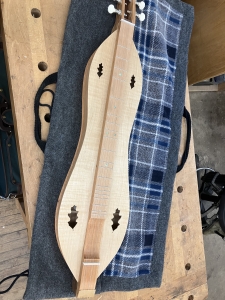
me: But you’ve also got a dulcimer you made. Why did it make sense to build your own?
KMcL: I wanted a new dulcimer, and decided to make one for about the same price as it would cost me to buy a handmade instrument. I went to the John C. Campbell Folk School in Brasstown, NC. It’s a school for crafts, and mine was a week-long class. Everyone in the class made one dulcimer, not from a kit. It had been years since I’d made an instrument, so I really enjoyed getting to use tools again.
me: I like this word I learned from your website: Neo-Traditional. What does that mean to you?
KMcL: I’d heard that before from some of the West Virginia musicians, and I liked it, so I adopted it as a description because I do cross between traditional music and new music all the time. I perform traditional music, but you can hear tradition in my original music. I thought that Neo-Traditional label was pretty good. I like it a little bit more than Americana.
me: I agree with you. And Skip Gorman chose one of your originals for his Favorite old time American fiddle numbers (From the Hills and Prairies.)
KMcL: Yeah, he did, as a favorite old time American fiddle number. I think he also has one of his own on there.
me: I mean, do you kind of give yourself an extra brownie point for that?
KMcL: He liked that tune because it did have those things about it that he likes about old time music. So it was a big compliment.
me: That’s what I was thinking. It’s pretty great. I want to hear more about “Bread on the Morning Train” and the story behind it.
KMcL: Where did you find out about that?
me: I don’t even remember. I’ve been reading up on Kate McLeod for a month, but today was the last-minute cram study.
KMcL: I like that song a lot. And I’ve not put it on a recording yet. I’ve sung it live, and I think I did it on one of my streaming programs during the Pandemic.
So that is a song about a story my mom told me from when she was a young child. She grew up in rural Maryland, northwest of Baltimore, near Hampstead. Of course the whole family lived there – her grandfather lived one train stop away. It was just like two or three or four miles or something like that. And her mother, my grandmother, would bake bread and the conductor would allow my grandma to put a loaf of bread on the train for her dad to pick up at the next train stop.
There’s so many things about that that are really neat. You could do that kind of thing back then. So simple. She was at the house all the time, and she could send her dad some food on the train.
me: It reminds me of something, and this probably doesn’t happen anymore either: I read that if you went to Scotland, you couldn’t hitchhike because nobody would pick you up, but you could give money to the postman and he would let you ride along.
KMcL: Oh, I didn’t know that.
me: I’m sure they don’t do that anymore. I want to see the real country; go with the postman and you’re gonna get it.
KMcL: I heard a similar story: In Southern Utah when they would have dances – I mean, everybody was spread all over the land with these little tiny homesteads – and they would have community dances. Very few people had a car, but there was a postmaster person who had a wagon, and they would do the rounds and pick up people, and bring people to the dance.
me: I swear that a lot of the people saying “Make America great again” – that was what they wanted. Let’s celebrate rural America – it’s very different than the cities, but cities have something different to offer.
If you want to know what’s really going on, you have to go to the music, I think. One of the things about Folk: It’s music of the people, first and last. In that light, how do you get a residency with Quakers?
KMcL: They have an artist in residence at Pendle Hill, which is out near Philadelphia, a famous retreat center of theirs, every year. Sometimes they’re a writer, sometimes they’re an artist, sometimes they’re a musician. I lived there for six months. And I wrote a whole collection of music there.
me: I bet you did.
KMcL: That’s what got me into this mess: I just write music off the top of my head. The whole project from my work at Pendle Hill’s Quaker retreat is called A Harmonious Sound. There are a few things on YouTube from that.
I haven’t formally released the whole collection; I’d like to. I would use some of the original recordings that I made there, but I want to redo a few that have been updated since then. I do want to release that as a project; I don’t know, it’s in line somewhere.
me: I understand.
KMcL: Recordings take a lot of money and nowadays we don’t make our money back on them. They get really expensive. I have a Patreon site, which helps a lot. That money goes into my projects.
me: Tell me some great things about Patreon.
KMcL: I like the fact that I can get online and send all these people little updates and things that no one else is really aware of, and they get to see things and hear things before anyone else does. That’s really fun. Also, they have a real interest in the details of what I’m doing, and they show that.
Another thing that I like about it is that people can participate at whatever level they want to. Some people, they just want to give you a few bucks every month, and they don’t need anything more or want anything more. And they’re busy and they don’t pay much attention. And then some people really are curious about what’s going on. I like that it can go in any of those directions.
me: I’ve got a Patreon site; it’s like my special club. I have to be mindful of asking first before I send things. They might not want anything. This week was a printmaking week, and I had to stop and post: Do you want some prints? Because I will send them.
Art is personal. I’d rather send them something they like. I’ve had to calm down a little bit in that respect.
KMcL: They might not want stuff. When they sign up, I ask ’em that question: “Do you want items sent to you or not?” The nice thing about music is it doesn’t have to be a stuff thing. The whole crowdfunding experience is really interesting, and it varies widely. I don’t know exactly how some people make thousands and thousands of dollars a month on their Patreon. I don’t know how that happens because I don’t really push it like that. It is possible for that to actually be enough, a sustainable amount for people. It is possible.
me: Let’s talk about painting. How much do you do that?
KMcL: Only for the music projects!
me: Really…so how do you know? You get the music project and you think, “Okay, now I need a painting for this?”
KMcL: I don’t know what gets over me. One of my best friends has these little parties where we have three or four people there, and we get out the art supplies.
So first of all, backstory: my mom is a really fine artist. She was a scientist for a living, but she had scholarships to study art when she was a young woman and instead became a scientist. She maintained her studies of art throughout her life, and she studied with some really great artists. So it’s in the blood a bit. And I also did study fine art in undergrad in Utah after I studied at the violin-making school. I studied fine art. I’ve done all different mediums, including pottery.
me: I’ll tell you the way I usually think: They’re each different vocabularies.
KMcL: Yes, they are.
me: So for me, sometimes – and you’re probably coming to this – sometimes the vocabulary needed is music or words, or sometimes it’s a picture, or sometimes it’s both.
KMcL: Right. I get very inspired by a song. I love songs so much that it’s really easy for me to just say, oh, I need a little piece of artwork for this song. All the singles I’ve done in the last few years, I’ve done the artwork for them.
My mom has watercolors here at her house, so I did one of them here (in Harper’s Ferry.) And she’s so cute because she’s a formal artist. I did one with daffodils, and the daffodils were going off the side of the painting and she’s like, “No, no, no, no. I can’t handle that.”
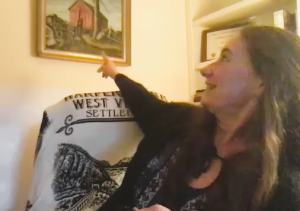
Kate MacLeod shows her mom’s painting
She’s really funny about that. But this is one of her paintings, what she did when I was a kid.
me: Oh, that’s nice! I’ve been looking at that the whole time we’re talking. My grandma was an artist and my mom was somewhat, but then she was a mom first and foremost.
My grandma used to drive around Northern Indiana, take pictures of barns, and paint them. I went to visit her as an adult and found she was out back throwing her paintings into the burning barrel. She used to drive around Northern Indiana, take pictures of barns, and paint them. She was burning them.
I said, “Can I keep one?” And she said no.
KMcL: Really?
me: So I stood there with her until she was done burning them all, and then we went in the house and had hot cocoa or whatever. I get goosebumps now thinking about it. I don’t know what was on her mind.
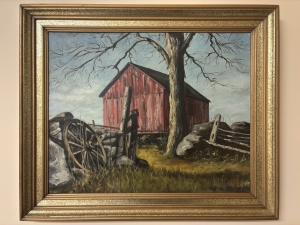
barn painting by Kate MacLeod’s mom
KMcL: I found this in the basement. I took it up to my mom and I said, “Look what I found. Remember this painting?”
And she said, “Oh, that old thing.” She doesn’t want to look at it. So I keep it in my room.
I really do enjoy creating. All of these art forms are related. A song is a painting in words, a song with melody and lyrics. It captures something the way a painting can. They’re all really related to me.
me: Yeah, me too. In fact, I’d say that the thing I got the most excited about this afternoon was that instrumental: “Train across the Great Salt Lake.” I love that so much. I’m going to listen to it a hundred times. I might paint something. That song is what the color of the inside of my heart looks like. I love the wincing fiddle at the beginning. I don’t want you to get excited because you never know; but if something visual does come of it, I will share with you.
KMcL: Oh my gosh. If I would love it if someone did a piece of work on that. When that came to me, because I was out in the West Desert, which is what we call the area west of the Salt Lake, there’s nothing there. I was with one of my friends and that train…years and years ago, it was a passenger train, but now it’s just a private train. Sometimes the military uses it and it goes across the lake on this set of tracks that goes across the water. And if the water’s high enough, it looks like the trains is riding on the water. We watched this train come – all the way – and pass us by. I’d never seen a sight quite like that.
me: I can imagine.
KMcL: I wanted to make a video and take video of it, but when I called to get the schedule, they wouldn’t give me the schedule. They don’t want you to know about the schedule.
me: Right, right. Yeah. It might be military.
KMcL: This song writer is so dangerous! So I never did just go back and wait for it. That’s a bit of a commitment out there in the desert, and it’s more fun that it just happened at that time.
me: I mean, so many of these things that we do, the songs and the poems and the paintings are snapshots of something we were unable to take a picture of. It’s what we do, and I think it’s important to have multiple vocabularies to draw from.
KMcL: Well, interestingly, like these Jean Ritchie songs I recorded…I spend a lot of time with these songs. I’ve been singing some of them since I was young. Her son sent me her songbook, and I’ve just pored over that songbook for years now. And so I feel they’re personal to me. That’s another reason I create a piece of art for it. I have a relationship with this song.
me: So really, one vocabulary is not enough. It’s like, no, I have to tell you again, but I’m going to tell you this way.
KMcL: That’s right. That’s right.
me: I know what we want to talk about: summer camps, and education in general. I suspect you have a lot to tell me.
KMcL: I’ve taught in so many different ways with music. For many years, I did a lot of private teaching. I had 25 – 30 students a week. But then I got to the point where I started to get busier playing out, and I couldn’t do those weekly lessons.
Young people need consistency; I dropped all my young students because they just needed me to be able to focus more on them. My private teaching has gone to intermittent lessons with people who don’t need to see me every week. Usually I give a really long lesson, which is fun. We get really in-depth because they won’t see me for a while. So I love that. And then I usually do at least one summer camp every year, and I teach fiddle lessons and song-singing, sometimes songwriting, depending on the age group and what they want, and depending on the camp and what they need.
I do workshops at festivals. There are some teachers that have me come in once a year or twice a year and give a workshop to their whole crew of students. I love to do that. I love the workshop experience. I can divulge a lot of information, and the students will soak up what they need or what moves them at the time. And more than anything, I really want to inspire students about how important the music is and why music is passed down, what it does for people. And also give them the understanding that they, regardless of their level, have their own voice.
me: That part is so important. So what do you tell them is the importance of the music being handed down?
KMcL: No music is from a vacuum to begin with. Now, a lot of these kids, especially young kids, they’re listening to pop music. In their short life experience, it may just seem a recent thing. Well, none of that would’ve happened if it hadn’t been for old songs. If you give them details, that’s really fun… I think one time I compared some pop star with Robert Burns. There was some similar subject matter in the songs.
I put the lyrics side by side and I said, “Look at this. This is a brand new song by your favorite pop artist, but look at this written so long ago.” And then I talk about out how the newer musicians are always informed by the music that came before them. None of this stuff comes out of a vacuum.
And the other thing that I really try to stress with youngsters is that there was a time before radio –
me: Oral tradition. It’s got to be inconceivable for some people.
KMcL : – so to actually have a time in your day when you share music with people in a formal setting, that used to be something that happened all the time.
me: That’s the America I want back.
KMcL: I know. Wouldn’t that be nice?
I remember on Sundays we’d go to my aunt and uncle’s house, and we all had Sunday dinner together whenever possible. And my uncle would play us the latest LPs. Everyone in the room of all four generations would sit there and listen to this LP he bought that week. Or he would play the piano. I was studying violin, and he’d say, “Well, how’s it going with your violin?” He says, “Can you play something for me?”
And I would say, the typical classical thing, “I don’t have any music with me.”
And he’d say, “You don’t need that.” And then he’d just go play his piano.
Well, that was an eyeopener to me, and a big influence on me is that they weren’t telling me in my music lessons that you could just play music. My family members were doing it. And so I really wanted as much of that as possible at a young age. And so I think it was that quest for having that that really led me to Folk music.
me: So what do you like or dislike about the summer camp setting as opposed to the other workshops?
KMcL: I love to have a week or something where to know people a little bit better and you can do some follow up. Also, the preparation is interesting because I want to come with the tools I might need, Not knowing who’s going to be there exactly and exactly what everyone will need, makes it really tricky for the instructors. So it’s a chance for me to do a lot of homework. And, quite honestly, I don’t think I really have the time to do that unless I had to go do it.
me: Yeah. I’m seeing it’s an opportunity for a workout from the teaching perspective.
KMcL: It is! All of a sudden I’m researching and learning a new song for this class and whatnot. I’m really grateful for that: I have a chance to enrich myself while I’m going to go help people, musicians, at whatever level they’re doing. But I really love to see the people’s eyes light up when they get something.
me: I’m thinking of when it happens to me: when the light bulb goes on over my head, oh, it’s the best.
KMcL: I think a lot of people, a lot of music students, need permission somehow to be free with it. A lot of times we’re worrying about technique, especially on an instrument like the violin. There’s so much that goes on with the technique and whether it’s in tune. Everybody’s always so worried about playing that a lot of students are very self-conscious.
Summer camps especially, when you get the time to spread out a little bit over the days, have different musical experiences. People can really find a new freedom in being a learning musician. And I love also the after-hours things like the dance or something, where we’re all on stage playing tunes for people dancing.
me: The camp setting is so multi-faceted. But you also do a thing…going down the river?
KMcL: I do a whitewater rafting trip. Every summer this a company has me come on a trip and I’m the resident musician. And after dinner, there’s a little quiet time. We sing some songs together. I might lead people in song or just play for them while they’re eating. It can vary depending on what the day is, how late we get into camp. But I write a song every day on the river. I share the song with them that night.
me: So it’s not like a workshop. It’s you writing a song.
KMcL: No, it’s not a workshop. But I usually write the songs inspired by what’s going on. Sometimes the people on the trip get in the songs. There was this little boy on the trip and I wrote a song for him. And I got a little thank you note when I sent him the lyrics later. And he came again this year on the trip.
And so on my upcoming recording, the songs I sent you to listen to, there are two on that from river trips. One of them is called “Beneath the Night Sky” – that’s just about falling to sleep underneath the starry sky with your friends.
On these river trips we camp, pull over on a little sandbar. That’s the campsite. And we’re not all that far away from each other. Everybody’s got a cot and it’s so dry, it hardly ever rains out there. So we just set up cots for the night. We have a piece of plastic next to us. If it rains, we pull that over us. And then when it stops raining, we just put it back on the ground.
The other song is “The plans are Written in the Sand.”
me: Look, I had to stop listening to that one because it’s really hitting me where I am right now. I’m going to listen to it, though.
KMcL: Listen to that later. So I started that song because the river guides were talking; they’re always really interesting people.
Some of them are career river guides, but some of them are like college students on summer break, and they’ve been running rivers all their lives, and they do this as a summer job. So you get that combination, and the younger guides are always going to the older guides for advice and things.
And so I was listening to a couple of them talk about the trip. And the younger guy was saying, “I want things to be really perfect, and I’m worried about things being done right.”
And the other guy said, “The plans are written in the sand, but the wind is blowing.”
me: I love those moments where you’re just like, “Oh, that’s a song.”
KMcL: I worked on it all day while we were on the boat, and I sang it for them that night. And they get such a kick out of the fact that I’ll just hear something they say; next thing you know, it’s a song. I really have fun with this company. They’ve had me I think seven years now. I’ve been down the Grand Canyon, the Green River, different sections of it.
me: That’s very cool! I’ve been struggling with the idea that nothing is permanent. The only thing you can count on is a lack of permanence. And it’s so frustrating sometimes. But yeah, the plans are written in the sand and the wind is blowing.
KMcL: Looking after my mom and watching someone approach 100 like this, there are a lot of aspects to it that are interesting, but it’s also helped me work through some life issues of my own. I’ve been helping her out since the pandemic started because of this whole shutdown. She was alone, and my whole year was cancelled. I did a streaming program during that terrible year where everything was canceled, but I felt she shouldn’t really be alone.
So I said, “I’m going to come back and keep you company.” And so I’ve been doing this (half the year in in the west, half the year in West Virginia) ever since. And at first it was very hard. It did bring up a lot of stuff that I apparently had not worked on.
The “I Have a Dream” song from my Quaker artist residency, I hemmed and hawed about whether I would put that on my album because in some way in the past, I’ve been such an activist in my life. And then during the pandemic, I think I got shell-shocked a little bit during the pandemic and these elections that really affected me.
me: I know. I’ve been transported back to elementary school playground with the bullies, and I’ve had several mini crises where I’m like, for all this stuff I’ve been doing for the past 10 years, especially the past five years, is there any point?
KMcL: I really struggled with a lot of things along those terms. The album’s going out on Westmoon Records, which is a nonprofit organization. When I was talking to the guy who’s the in-house engineer and handles the contracts, everything for the label, I talked to him about this song. I said, “I’ve got this song that I did in the concert. It’s a live concert, and I’ve done this song a lot since I wrote it, and people really like it.”
I said, “…but it’s really woke.”
me: The tradition it’s drawing from is the sixties. Not the forties, not the Gold Rush…
KMcL: I was born in 61, but I remember from the get go all the stuff that went on. My dad worked in DC. I remember all the stuff they watched on the television, and they’d talk about it around the dining room table, all the marches… That was a big part of my early years, and I am really glad that I grew up around that. It really did inspire me in so many ways to see change going on and hearing people talk about it and watching all that stuff happen. And then something happened with the pandemic and these recent elections we’re talking about.
I said to the guys, “ I’m a little reluctant to share a really woke song right now. I’m kind of fatigued about the world.” I am sure I’m not alone in this. I’m fatigued. I am shocked, shocked that women are still having to talk about our rights.
And he said, “It doesn’t matter.”
I said, “You all listen to it, and if you have a problem with it, let me know.”
He says, “It doesn’t matter to us. Whatever you want to do.”
It’s not an offensive song. I’m not pointing any fingers. I’m just bringing up these things that I remember were a big influence on me.
I listen sometimes to these women from Oklahoma, and they’re really out there in left field, and they’re called the “I’ve Had It” podcast. It has morphed into a highly political thing.
They do not mince words. They’re proud of fighting, trying to represent everyone. They talk about what’s going on with the school system now, the 10 Commandments going up on the wall and all this stuff. Separation of church and state was always really an important aspect. One time I was watching that, and Jennifer, one of the women, she was so confident about the need to be yourself and be present with what you believe in.
I decided to keep that song on the album because of that.
me: this is what I tell my writers, my editing clients: If you’re not sure about something, and you think you should possibly take it out – do more of that. Put some boots on it, march out there, and do more of it. Then if it doesn’t feel right, you can take it out.
KMcL: When it came to deciding about that song, I really had to study myself a little bit about it. So many times I’ve dealt with the misogyny, in the music business, in the world, and all this stuff that shows up in subtle ways. And I’ve spent so much of my life keeping quiet because you don’t want to make waves. And I realized I’m old enough to do whatever the hell I want.
me: Exactly. I understand the concept of keeping within the lines and doing things because that will work for somebody. But if I’m pretty certain that somebody is not gonna be me, then I need to go do what I want. I like that song a lot. And I like how it’s just different enough from the rest.
KMcL: Very different. Has a different mood to almost anything I’ve ever recorded. It’s a side of me. And also there’s something about being myself; it made me realize how affected I’ve been by what other people think. When I started to realize, “Should I put this on the album? Yes.” And then I realized how deep that is with me. Am I just finding this out?
me: That’s another thing I’ll fight for too, because those songs are you, too. This is why I do my blog and I want to talk about art and music, because we’re all multifaceted in some way. I want children to understand that yes, you have different sides, and all of them are valuable, and all of them are legitimate. You might not be able to use them all at the same time, but keep them. Understand them, love them. Society has for years now tried to get us to pick one thing, cultivate your brand so that people understand what they’re buying.
I can’t.
KMcL: I can’t either.
me: No, I need all of those vocabularies.
KMcL: I agree. I do too. And I think that, I’ve talked with a lot of musicians about this. We struggle so much with genre. It’s hard when you’re still trying to get your foothold –
me: – because nobody will give you traction unless they know what to call it.
KMcL: And so I got into the music business very late for a professional musician. I mean, I was doing it for years, but it was such a gradual stepping stone. I mean, I stayed home for 10 years with my kids. I wasn’t working. And then I gradually got into the performing and playing, and now I do it all the time. But there were many years where I didn’t do it all the time. I was already beyond the time when a major label or anything would pick me up because they want a young person.
me: Well, now all the parameters are changing anyway. Even the young people can’t expect a limo to come pick you up for whatever. Everybody wants to know how much of a platform you’ve already built for yourself, or they’re not even going to talk to you.
You have to have support. This is how people do things: My friend’s been telling me for years that I need to have my art in her local coffee shop. Finally, the two of us put our heads together, did the research, and found out what it would take. And it’s happening. I’ve got an art exhibit in St. Charles, MO.
KMcL: That is a really good friend. It’s much better to work as a team with someone. You brainstorm about things and you have twice as many hands on the project, and it’s fun. It’s just not fun to do some of these projects all by yourself.
me: Other people have access to words and music that you don’t, so now you’ve suddenly doubled your influences.
Thanks for the great conversation. I may see you at the Ashburn Library.
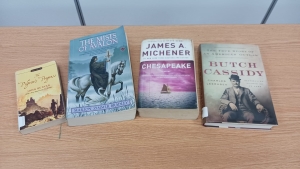
books which inspired Kate’s songs
KMcL: At the library, I’m going to do some of my songs written about books – of course, at the library. And I’ll have two musicians with me. One is a young woman, Meya Collings. She’ll be performing with me, and she’s just a delight. Her singing is beautiful.
She’s sung on a couple of my recordings. She’s a music savant. She can actually play just about any instrument, such as pipe organs of all things. She’s a church organist.
me: The job of church organist is a perfect example of art as a service, and how it helps the person who’s delivering the service just as much as it helps the people receiving it.
KMcL: I think art is a service as well. My job is to make other people feel good and think , to feel good, to be human, enjoy stories about being human. It’s a very interesting relationship between creating something and then what happens for the people that it goes to.
me: It really is. Another one of those things that just cannot be pinned down.
- Paul Hammerton
- Kate and Meya
- Kate MacLeod and Meya Collings
- I’m a fan 🙂
- Paul and Kate
- Paul Hammerton and Kate MacLeod
- Meya Collings
- Is it even Folk without kids?
- Live at Ashburn Library
I went to the library. I met Kate, and Meya, and Paul, and heard these wonderful songs about books as well as some very traditional Folk and songs by Utah Phillips. Meya gave me the best hug ever, and Paul kindly tolerated my game of “do you know this person I know in England?” (hey, sometimes it works.) The person who’d come the farthest to see Kate was her friend Jeanette from Utah. This is music you don’t want to miss if you ever get the chance. Come to West Virginia…or Utah.
“Early Fields,” her Jean Ritchie cover, just dropped on the very day I’m writing this article. Perennial, a full-length live concert recording, drops Sept 19, 2025 on Westmoon Records. That’s another thing you don’t want to miss.
 debora Ewing writes, paints, and screams at the stars because the world is still screwed up. She improves what she can with music collaboration, peer-review at Consilience Poetry Journal, or designing books for Igneus Press. Follow @DebsValidation on X and Instagram. Read her self-distractions at FolkWorks.org and JerryJazzMusician.com.
debora Ewing writes, paints, and screams at the stars because the world is still screwed up. She improves what she can with music collaboration, peer-review at Consilience Poetry Journal, or designing books for Igneus Press. Follow @DebsValidation on X and Instagram. Read her self-distractions at FolkWorks.org and JerryJazzMusician.com.
Kate MacLeod and the Beauty of Impermanent Things
NUMBER 39 - in which we talk of art and music, water, family, and trains (some with bread.)
September 2025

